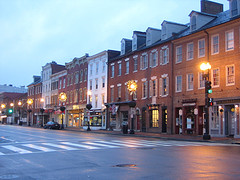“I never owned any slaves and you never picked any cotton.”

M Street in Georgetown. No, the restaurant isn't pictured.
I walked in to one of my favorite restaurants in Georgetown on Saturday, famished and ready for a salad– that’s not contradictory, it’s very filling, I promise. The manager, nattily dressed as always, approached me and gave me a kiss on the cheek. Not the Georgetown air-kiss, mind you. I’m no socialite and he’s no enabler. He’s just very old-school, from his ever-present formal cuff links to his defiantly-retro mustache. The interesting thing was, I was about to find out exactly how retro he truly is.
I’ve been eating at his restaurant for almost a decade and he is kind to his regulars, so he seated me himself and ordered one of his staff to take great care of me. Again, this is not as exclusive as it may sound; I heard him issue the same command twice while I munched mixed greens and goat cheese. That’s just the way he is. He’ll be walking from one end of the restaurant to the bar and he’ll turn, lock eyes with you and wink merrily. Old-school.
When he had a moment, he walked up and asked how I was doing.
“What are you up to these days?”
“I just started an amazing new job up the street, at WAMU.”
He nodded. “I listen to them. Are you on the air?”
This happens to me every time I tell people where I work. Perfectly understandable assumption and reasonable question for a person who works at a radio station.
“No, they hired me to write for a new website called ‘DCentric’. It’s about race and class in the district.”
“Race and class? THAT’s your beat?”
“Yes…” I stammered a bit. He looked incredulous and I immediately wondered if he was going to launch in to a litany of reasons for why that was silly. I continued, awkwardly. “They’re topics which really need to be explored, right now.” I said, earnestly. “Some may think we’re ‘post-racial’, but at the same time, we’re in the midst of a Mayoral race where people love hearing about how white people love Fenty and black people prefer Gray. We’re consumed with race in this city.”
He regarded me skeptically. I took a deep breath to continue to make my case, fully aware of how if this were someone else, I wouldn’t feel compelled to do so. Perhaps because of his age, he reminded me of one of my Dad’s friends, the kind of person I go to greater lengths to explain (or justify) my choices to. When I opened my mouth, he cut me off decisively.
“Not in this city, in this country. This whole country is consumed with race.”
I was slightly shocked. I hadn’t expected that!
“Let me tell you a story about race”, he said. “Just happened last week when I was down in Florida.”
I nodded and put down my fork.
“I was meeting up with some old buddies of mine from undergrad, couple of them went to law school, one of them went to Yale law school. He’s black. And he kept, talking, talking about slavery. Wouldn’t stop. Slavery, slavery, slavery. Finally, one of our friends looks at him and says, ‘Frederick*, I never owned any slaves and you never picked any cotton. Move on.’”
I placed my palm under my jaw, accomplishing two things: I looked like I was interested and it prevented my jaw from dropping.
“Don’t you love that?”, he asked. “I’ll say it again, ‘I never owned any slaves’” he repeats, pointing at himself when he emphasizes the word “I”. “And YOU never picked any cotton”, he finishes, pointing at me before convulsing with laughter.
Let me be clear: I don’t think he, an older white man, meant anything specific by pointing to me, a person of color, while reciting the line about picking cotton. But I do think he really loved and agreed with the sentiment which one of his friends expressed to another.
“Doesn’t that just sum it up, beautifully?”, he asked. “Done. I never owned a slave, he never picked cotton. I mean, he’s a partner with a firm on Wall Street, been there for years. He sure didn’t pick any cotton.”
“How did your friend feel at that point?”, I asked carefully, extremely interested in what he might say.
“Ah, you know.” He gestured dismissively.
He clapped me on the shoulder warmly and said, “It’s good to see you.” before walking away.
::
*Names have been changed to protect African-American lawyers whose skill set does not include the harvesting of staple fibers.
-
Salil Maniktahla
-
Salil Maniktahla
-
ccmartin
-
dcentric
-
DC_Driver_and_Dispatcher
-
acbjrpfx
-
Kevin



